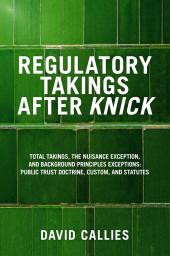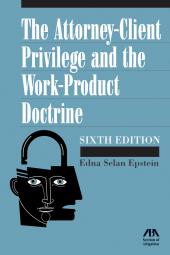Regulatory Takings after Knick: Total Takings, the Nuisance Exception, and Background Principles Exceptions: Public Trust Doctrine, Custom, and Statutes
Select a format
 International Order Inquiry
International Order Inquiry
Select subscription type
Terms & conditions
One Year Subscription Only Terms
Subscribers receive the product(s) listed on the Order Form and any Updates made available during the annual subscription period. Shipping and handling fees are not included in the annual price.
Subscribers are advised of the number of Updates that were made to the particular publication the prior year. The number of Updates may vary due to developments in the law and other publishing issues, but subscribers may use this as a rough estimate of future shipments. Subscribers may call Customer Support at 800-833-9844 for additional information.
Subscribers may cancel this subscription by: calling Customer Support at 800-833-9844; emailing customer.support@lexisnexis.com; or returning the invoice marked 'CANCEL'.
If subscribers cancel within 30 days after the product is ordered or received and return the product at their expense, then they will receive a full credit of the price for the annual subscription.
If subscribers cancel between 31 and 60 days after the invoice date and return the product at their expense, then they will receive a 5/6th credit of the price for the annual subscription. No credit will be given for cancellations more than 60 days after the invoice date. To receive any credit, subscriber must return all product(s) shipped during the year at their expense within the applicable cancellation period listed above.
Product description
View a sample of this title using the ReadNow feature
The Supreme Court’s recent decision in Knick v. Township of Scott has been aptly described by some commentators as the most significant property rights case of the last decade. In Knick, the Court found the regulatory takings claim, which had not yet been denied compensation in state court, was ripe nonetheless. In doing so, the Court explicitly overturned the second prong of the so-called Williamson County ripeness test that required property owners to seek a remedy through state action -- usually just compensation -- for the alleged taking before coming to federal court.
The elements of these exceptions are explained in great detail in separate chapters. Understanding these exceptions is critical to litigating about land use regulations for such as open space, agriculture, and preservation/conservation where the subject land is left without any economic use. If the exceptions apply, the landowner gets no compensation. If the exceptions do not apply, the landowner prevails.
eBooks, CDs, downloadable content, and software purchases are noncancelable, nonrefundable and nonreturnable. Click here for more information about LexisNexis eBooks. The eBook versions of this title may feature links to Lexis+® for further legal research options. A valid subscription to Lexis+® is required to access this content
 Lexis Nexis
Lexis Nexis

